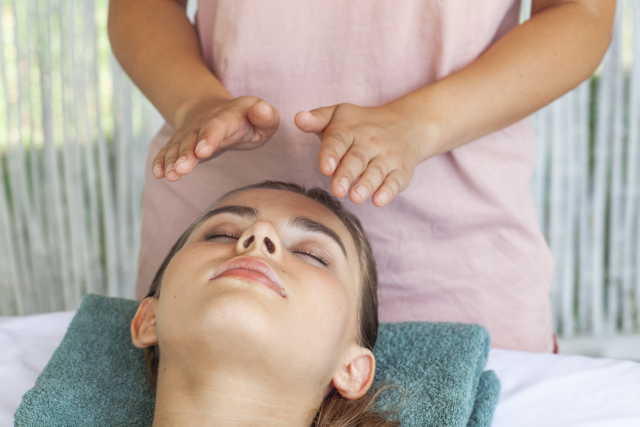Reiki

Reiki is a Japanese holistic practice that aims to promote balance, relaxation, and well-being by resonate with Universal life energy through the practitioner to the recipient. The word "Reiki" is often translated as "universal life energy", with "rei" meaning universal or spiritual and "ki" referring to the life force energy that flows through all living beings.

Short history of Reiki
Today's Reiki system was founded in 1922 by Mikao Usui. He was born on August 15 (June 24 in the Japanese old-style calendar), 1865 inTaniai, Yamagata County, Gifu Prefecture, Japan. After having many different jobs, he then began searching for the true meaning of life. He trained at a Zen Buddhist monastery wishing that he would be able to reach the true purpose of life. But it was not so easy for him to get it. As his master monk tell him “You need to experience death.” , he decided to die and began fasting at Mount Kurama, of Kyoto.
On 21st day, he felt he was struck by very strong lightning on his head and lost consciousness. Then, he woke up with an unexperienced feeling. It was an experience of Oneness. He truly felt “I am the Universe, the Universe is me." Soon, he found that he had received some kind of healing ability. The healing ability called Reiki has been known in Japan since ancient times. Through this experiences, he understood that the healing effect occurs when his inner Reiki resonates perfectly with the Reiki in the Universe.
He named his experience Usui Reiki Ryoho, and established the Usui Reiki Ryoho Gakkai in Tokyo in April 1922. Many Japanese joined him. He trained the 21 Shihan ( selected masters from among more than 2,000 disciples for their abilities and personalities), then he passed away at the inn in Fukuyama, Japan at the age of 60.
Cyujiro Hayashi, one of the 21 Shihan, a Japanese military doctor, opened a Reiki laboratory (Hayashi Reiki Kenkyukai), and improved various Reiki techniques for clinical/medical purposes. New Reiki Ryoho criteria and new hand positions were systemized based on his researches. These new things have been carried on to Western Reiki (Reiki developed outside of Japan in a more or less transformative way) and continue to be widely accepted in the world today.
One of his disciple, Hawayo Takata, a Japanese Americans born in Hawaii, USA in 1900 was the first Reiki Master outside Japan and so is called the founder of the Western Reiki system. She opened her Reiki clinic and treated many people who suffered from serious illness. She passed away in 1980, at the age of 80. In the years before her death, she trained 22 Reiki Masters. Today, all the Western Reiki systems in the world have originated from the lineage of: Mikao Usui → Chujiro Hayashi → Hawayo Takata → 22 masters of Hawayo Takata.

Explanation of the key aspects of Reiki
Energy Flow:
When your inner energy flows are disrupted or blocked, it can lead to physical or emotional discomfort. Reiki aims to remove these blockages and restore your natural flow of energy to resonate with the Universal life energy.
Hands-On Healing:
In a Reiki session, the recipient remains fully clothed and lies down or sits comfortably. The practitioner lightly places their hands on or hover over the recipient's body. The practitioner acts as a conduit for the universal life energy, which then resonate with the recipient, promoting relaxation and a sense of well-being.
Intention and Healing:
Intent before a session plays a significant role in Reiki. Practitioners are encouraged to have positive intentions for the recipient's well-being before starting a session and once a session starts they let the Reiki energy go where it is needed most
Benefits:
Reiki is well known for stress reduction, relaxation, and pain relief, but it is also effective to develop a sense of self-confidence, enhance concentration and focus, promote a sense of inner peace, improve sleep patterns, and boost immune system.

Reiki is considered a complementary or alternative therapy and is not a replacement for conventional medical treatment. People interested in Reiki should consult with a qualified healthcare professional for any medical issues they may have and consider Reiki as part of a holistic approach to wellness. The effectiveness of Reiki may vary from person to person, and its benefits can be highly subjective.